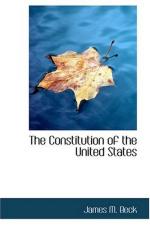Some days previous, namely, June 28, when the debates were becoming so bitter that it seemed unlikely that the convention could continue, Doctor Franklin, erroneously supposed by many to be an atheist, made the following solemn and beautiful appeal to their better natures. He said:
“The small progress we have made after four or five weeks’ close attendance and continual reasonings with each other—our different sentiments on almost every question, several of the last producing as many noes as ayes, is, methinks, a melancholy proof of the imperfection of the human understanding. We indeed seem to feel our own want of political wisdom, since we have been running about in search of it. We have gone back to ancient history for models of government, and examined the different forms of those Republics which, having been formed with the seeds of their own dissolution, now no longer exist. And we have viewed modern States all around Europe, but find none of their constitutions suitable to our circumstances.
“In this situation of this Assembly, groping as it were in the dark to find political truth, and scarce able to distinguish it when presented to us, how has it happened, sir, that we have not hitherto once thought of humbly applying to the Father of Lights to illuminate our understandings?... And have we now forgotten that powerful Friend or do we imagine that we no longer need His assistance? I have lived, sir, a long time, and the longer I live, the more convincing proofs I see of this truth: That God governs in the affairs of men. And if a sparrow cannot fall to the ground without His notice, is it probable that an empire can rise without His aid? We have been assured, sir, in the sacred writings, that ‘except the Lord build the House they labour in vain that build it.’ I firmly believe this; and I also believe that without His concurring aid we shall succeed in this political building no better than the builders of Babel. We shall be divided by our little partial local interests; our projects will be confounded, and we ourselves shall become a reproach and byword down to future ages. And what is worse, mankind may hereafter from this unfortunate instance, despair of establishing governments by human wisdom and leave it to chance, war, and conquest.
“I therefore beg leave to move that henceforth prayers imploring the assistance of Heaven, and its blessings on our deliberations, be held in this Assembly every morning before we proceed to business, and that one or more of the clergy of this city be requested to officiate in that service.”
It may surprise my audience to know the sequel. The resolution was voted down, partly on the ground that if it became known to the public that the convention had finally resorted to prayers it might cause undue alarm, but also because the convention was by that time so low in funds that, as one of the members said, it did not have enough money to pay a clergyman his fees for the service. I suspect that their controlling reason was their indisposition to break their self-imposed rule of secrecy by contact with the outer world until their work was completed. Perhaps they thought that “God helps those who help themselves.”




